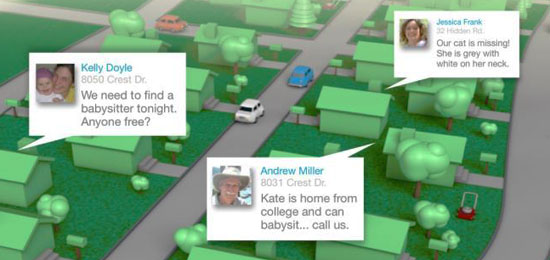A mother in Walnut Creek, California, recently placed an expensive order for baby formula and diapers that never arrived. Subsequent investigation showed that the package had been delivered but snatched from her doorstep.
That’s a common enough story in this era of e-commerce, but this one has a happy ending.
The woman knew the package had been stolen because she saw it happen on her surveillance video. Unfortunately the license plate was missing from the vehicle in which the thief sped away.
So she turned to a social network to see if anyone could recognize the vehicle — but not just any social network. The woman used Nextdoor, a very insular network devoted to connecting neighbors.
The video eventually was shared with the local police who asked the public for help. A tip led to a suspect who then was taken into custody.
Not the Facebook Model
Nextdoor could be dubbed “the antisocial network.” It launched in 2010, a time when a number of niche networks launched in the hope of chipping away some of Facebook’s turf. Unlike many of those sites, however, Nextdoor not only survived, but also has grown significantly reaching some 40,000 neighborhoods — or one in four communities.
One reason for the site’s popularity is its usefulness in solving petty larceny — stories that Nextdoor happily recounts on its blog. A story similar to the diaper theft unfolded earlier this year in Nashville, Tennessee, although that time the thief was making off with the neighborhood’s lawn mowers. A neighbor was able to snap a photo of the suspect and after the image was passed around on Nextdoor, he was identified and arrested.
Other stories illustrate how the site brings neighbors together to help each other in a pinch, such as the time a resident of a Columbus, Ohio, neighborhood asked for help handling a flooded basement was able to salvage many belongings, thanks to the neighbors who pitched in after seeing the plea on Nextdoor.
Basically the site hopes to recreate the ties people had with their neighbors generations ago. Nextdoor urges users to tap the network to find local resources such as babysitters or plumbers, to organize neighborhood events like garage sales and block parties, or to sell or give away items.
Because it was formed to encourage face-to-face ties, the site makes users prove they actually live in the neighborhood. The posts are seen only by people in the immediate area, and users cannot share posts outside of their network.
Why It Works
Why has Nextdoor succeeded when many other network launches have failed? In this case, it’s most likely because it is intent on forming ties among people who have a stake in the relationships.
“People living in a neighborhood form a strong community, as everyone has a vested interest in what’s going on around them,” Guido Lang, assistant professor of computer information systems at Quinnipiac University, told TechNewsWorld.
For many people, it also fulfills a universal need to be connected to people close by — something that has become more difficult for people in many communities to do.
Lang lives in Manhattan’s Upper West Side and barely knows the people living in his building, he noted.
However, “on Nextdoor, my neighborhood consists of a couple of blocks, and there’s active communication about garage sales, new restaurants and even monthly get-togethers,” he said.
Nextdoor is “a hyperlocal Craigslist meets Yelp mashup,” observed Lang.
One concern is that the site could be used as a conduit to spark paranoia and spread false information, he said, or even whip up mob hysteria in the wake of certain crimes.
That said, this is a social networking concept that clearly has legs. Other networks have sprung up that focus on building community ties in niche areas.
“I believe enabling better interactions on a local and community level is a strong new trend that is gaining momentum,” Vlad Zachary, director of omni-channel commerce at Upshot Commerce, told TechNewsWorld.
“There is a strong demand for services like that, and the likelihood that one or more of these networks will catch on in a big way is very real,” he said.
Indeed, it’s possible that one of these community-focused platforms could supplant some of today’s favorites, Zachary suggested.
“My bet is Nextdoor could be the next and better Facebook; List It Locally could be the next eBay/Craigslist; and Classy just might be the first truly [college-focused] network,” Zachary said. “If I had to choose one, I’d go with List It Locally — and that’s just because I have firsthand familiarity with their concept. They are still in stealth mode.”





















































